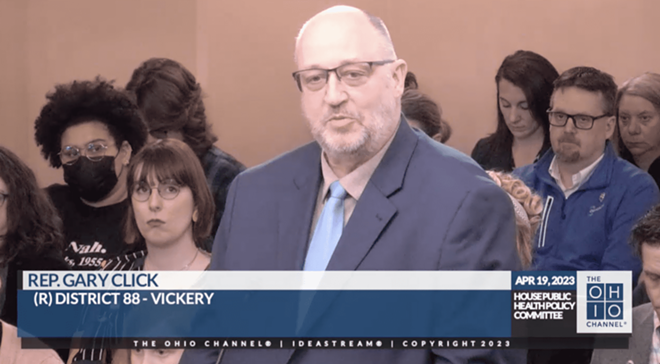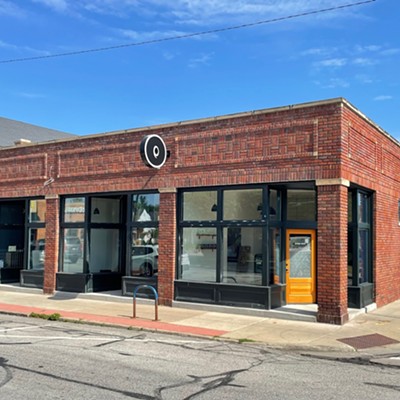Ohio Bill That Would Ban Gender-Affirming Care for Minors Gets Contentious First Hearing
Sponsor Rep. Gary Click answered questions about the legislation that would ban care widely supported and endorsed by the medical community
By Maria Elena Scott on Thu, Apr 20, 2023 at 7:59 am
[
{
"name": "Ad - NativeInline - Injected",
"component": "38482495",
"insertPoint": "3",
"requiredCountToDisplay": "5"
},{
"name": "Real 1 Player (r2) - Inline",
"component": "38482494",
"insertPoint": "2/3",
"requiredCountToDisplay": "9"
}
]
Ohio House Bill 68, the proposed Save Adolescents From Experimentation (SAFE) Act, drew a crowd and debate Tuesday in its first hearing before the Public Health Policy House Committee.
The "SAFE Act" takes aim at gender-affirming care for minors and bears a strong resemblance to last year's House Bill 454, which bore the same name and made national headlines, but ultimately was not passed.
The 2023 bill prohibits gender reassignment surgery on minors, the prescription of puberty-blockers to minors for the purpose of assisting with gender transition, and mental health diagnoses or treatment for minors for gender-related conditions without parental consent and screening for "other comorbidities, abuse and traumas", like autism, ADHD, anxiety, depression and more.
It would also prohibit Medicaid from covering gendering-affirming care and require mental health professionals to report the age, biological sex, comorbidities and number of minors they treat for gender-related conditions to the Department of Health every year.
For both mental and physical health professionals, the bill lays out penalties for those who "engage in conduct the bill prohibits."
"Essentially the SAFE Act is designed to protect young people from some radical, experimental medicine that is being used on our minors here in Ohio," said Republican sponsor Representative Gary Click. "Right now, minors are being prescribed hormone blockers, puberty suppressants, opposite sex hormones and they are also being provided surgery as minors for what they call gender affirming care.”
But some of Click's colleagues, and the general medical community, vehemently disagree. Advocates have said the bill is nothing but an assault on the trans and non-binary communities.
Gender-affirming care is recognized and endorsed by the American Academy of Child and Adolescent Psychology, the American Academy of Pediatrics, the American Medical Association, the Ohio State Medical Association, the Endocrine Society and the Pediatric Endocrine Society.
“Every professional society says, ‘hey these are the best practices for children in terms of supporting them.’ But what I’m hearing from you is that you believe all of these groups are just doing this as an agenda to medicalize children for the purpose of changing their sex, which is the reason that you're introducing this bill to prevent these best practices from being applied," said Democratic Representative and OBGYN Beth Liston of District 8. "So, I’d love your thoughts on why you think your approach, which goes against all other medical societies, is the best approach."
Click claimed he'd heard from people who regret transitioning, parents who felt pressured to get their children gender-affirming care, and doctors who have been pressured or intimidated to perform gender-affirming care. He also cited concerns of influence from the pharmaceutical industry to get minors to transition for financial gain and side effects sometimes caused by puberty blockers.
Puberty-blocking drugs can affect bone mineral density because lots of bone strength development happens during puberty. But some children not receiving gender-affirming care are prescribed puberty-blockers because of a condition called precocious puberty, where the onset of puberty comes before age eight or nine.
The bill would allow for the prescription of these medications in these cases because it deems them medically necessary.
But Democratic Representative and pediatric nurse Rachel Baker from Ohio District 27 added that the general consensus in the medical community is that puberty-blocking drugs are medically necessary for children receiving gender-affirming care as well.
It's also worth noting that the American Osteopathic Association supports gender-affirming care for minors.
Click, in a quote that speaks for itself, said, "I don’t believe there is such a thing as gender-affirming care.”
Coming soon: Cleveland Scene Daily newsletter. We’ll send you a handful of interesting Cleveland stories every morning. Subscribe now to not miss a thing.
Follow us: Google News | NewsBreak | Instagram | Facebook | Twitter
The "SAFE Act" takes aim at gender-affirming care for minors and bears a strong resemblance to last year's House Bill 454, which bore the same name and made national headlines, but ultimately was not passed.
The 2023 bill prohibits gender reassignment surgery on minors, the prescription of puberty-blockers to minors for the purpose of assisting with gender transition, and mental health diagnoses or treatment for minors for gender-related conditions without parental consent and screening for "other comorbidities, abuse and traumas", like autism, ADHD, anxiety, depression and more.
It would also prohibit Medicaid from covering gendering-affirming care and require mental health professionals to report the age, biological sex, comorbidities and number of minors they treat for gender-related conditions to the Department of Health every year.
For both mental and physical health professionals, the bill lays out penalties for those who "engage in conduct the bill prohibits."
"Essentially the SAFE Act is designed to protect young people from some radical, experimental medicine that is being used on our minors here in Ohio," said Republican sponsor Representative Gary Click. "Right now, minors are being prescribed hormone blockers, puberty suppressants, opposite sex hormones and they are also being provided surgery as minors for what they call gender affirming care.”
But some of Click's colleagues, and the general medical community, vehemently disagree. Advocates have said the bill is nothing but an assault on the trans and non-binary communities.
Gender-affirming care is recognized and endorsed by the American Academy of Child and Adolescent Psychology, the American Academy of Pediatrics, the American Medical Association, the Ohio State Medical Association, the Endocrine Society and the Pediatric Endocrine Society.
“Every professional society says, ‘hey these are the best practices for children in terms of supporting them.’ But what I’m hearing from you is that you believe all of these groups are just doing this as an agenda to medicalize children for the purpose of changing their sex, which is the reason that you're introducing this bill to prevent these best practices from being applied," said Democratic Representative and OBGYN Beth Liston of District 8. "So, I’d love your thoughts on why you think your approach, which goes against all other medical societies, is the best approach."
Click claimed he'd heard from people who regret transitioning, parents who felt pressured to get their children gender-affirming care, and doctors who have been pressured or intimidated to perform gender-affirming care. He also cited concerns of influence from the pharmaceutical industry to get minors to transition for financial gain and side effects sometimes caused by puberty blockers.
Puberty-blocking drugs can affect bone mineral density because lots of bone strength development happens during puberty. But some children not receiving gender-affirming care are prescribed puberty-blockers because of a condition called precocious puberty, where the onset of puberty comes before age eight or nine.
The bill would allow for the prescription of these medications in these cases because it deems them medically necessary.
But Democratic Representative and pediatric nurse Rachel Baker from Ohio District 27 added that the general consensus in the medical community is that puberty-blocking drugs are medically necessary for children receiving gender-affirming care as well.
It's also worth noting that the American Osteopathic Association supports gender-affirming care for minors.
Click, in a quote that speaks for itself, said, "I don’t believe there is such a thing as gender-affirming care.”
Coming soon: Cleveland Scene Daily newsletter. We’ll send you a handful of interesting Cleveland stories every morning. Subscribe now to not miss a thing.
Follow us: Google News | NewsBreak | Instagram | Facebook | Twitter
SCENE Supporters make it possible to tell the Cleveland stories you won’t find elsewhere.
Become a supporter today.
Scroll to read more Ohio News articles
Newsletters
Join Cleveland Scene Newsletters
Subscribe now to get the latest news delivered right to your inbox.












